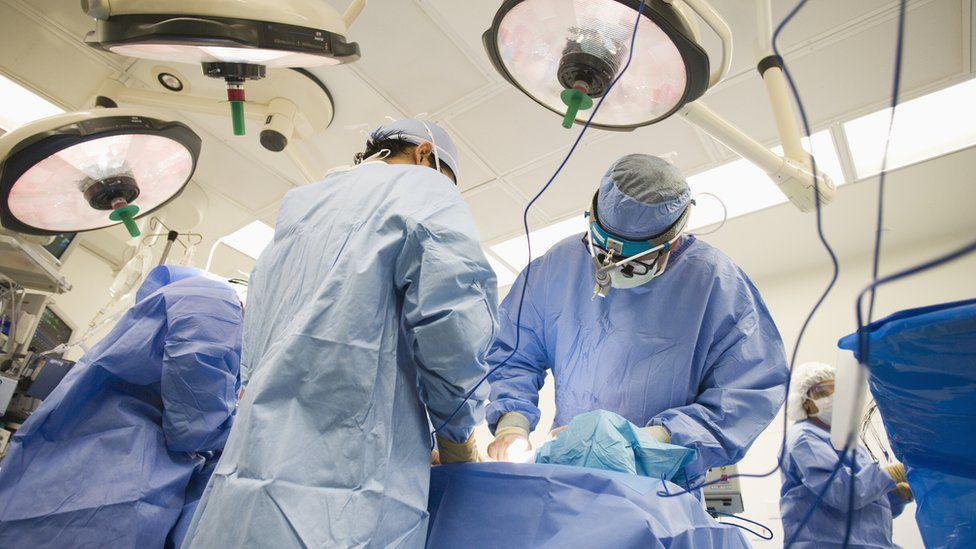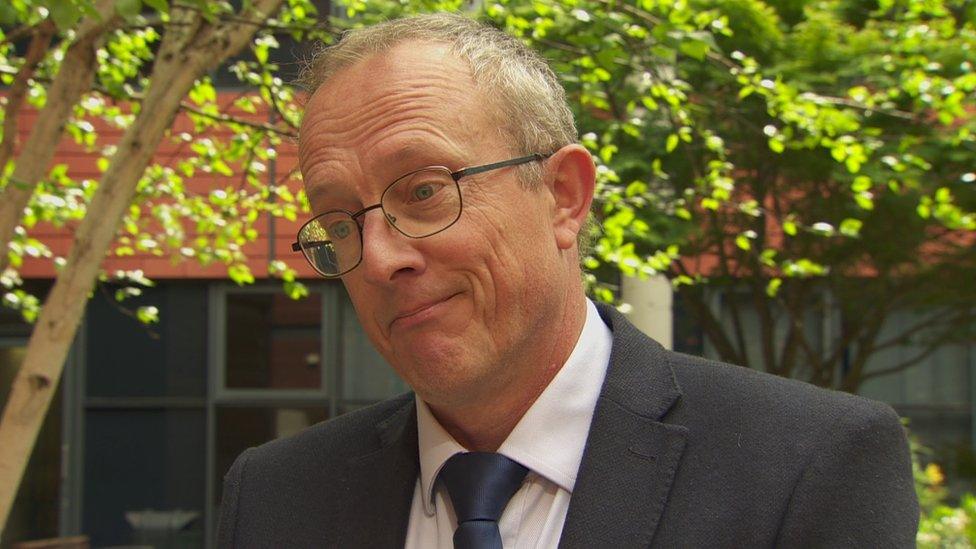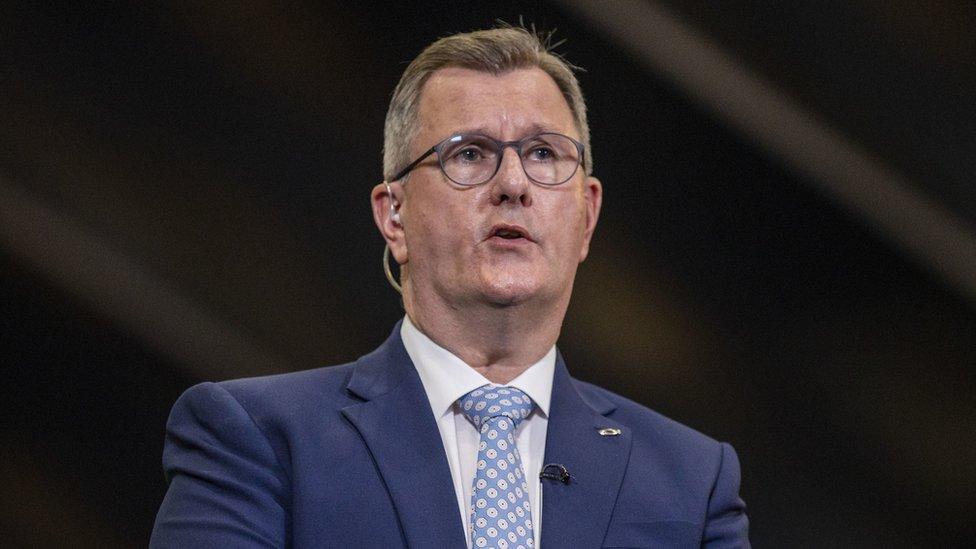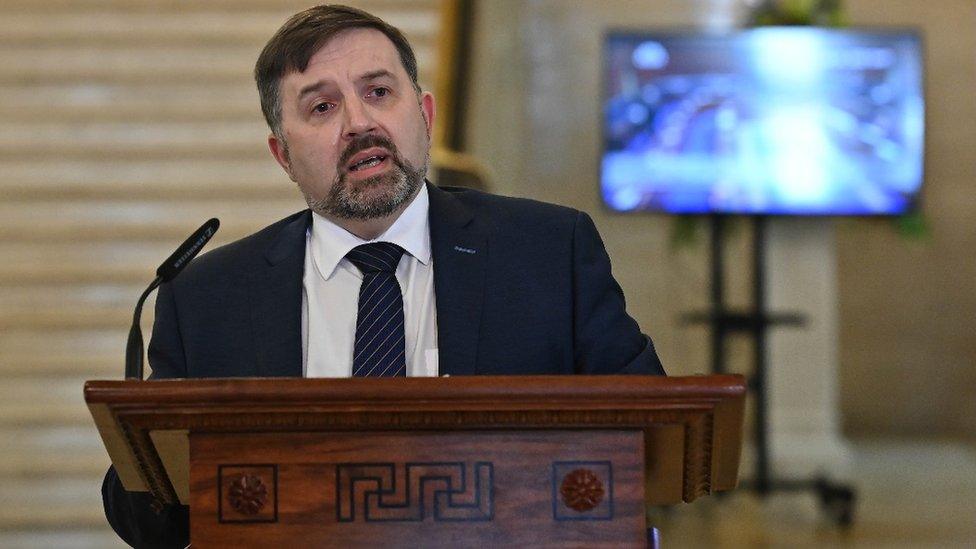NI health: Patients 'at risk' without Stormont executive
- Published
- comments

Politicians are being urged to put patients first in Northern Ireland
Healthcare leaders in Northern Ireland have urged elected representatives to "put patients first" and immediately form a new executive at Stormont.
The British Medical Association Northern Ireland (BMA) and four royal colleges said failure to go into government "will put patients at risk".
One said that "it is fair to say lives are being lost" and that things are getting "worse and worse".
The Department of Health said sustained year-on-year funding was needed.
Last week's election saw Sinn Féin win the most seats for the first time.
However, the Democratic Unionist Party (DUP) has said it will not go into an executive until there are significant changes to the Northern Ireland Protocol.
The protocol is an issue under fresh scrutiny following the elections to the Northern Ireland Assembly.
The elections cemented a majority for assembly members who accept the protocol, including the new largest party, the republican party Sinn Féin.
The DUP said it would not nominate any ministers to a Northern Ireland Executive until its concerns about the protocol were resolved.
It has also refused to say if it will support the election of a new Speaker when the Northern Ireland Assembly meets on Friday.
The executive can not properly function without a first and deputy first minister.
Caretaker ministers, who were in post before the collapse of Stormont in February, can continue to run their respective departments without an executive, but no new decisions, such as agreeing a budget, can be taken.
But speaking on behalf of nurses, surgeons, GPs, and emergency doctors, the healthcare leaders urged politicians to agree a multi-year budget to allow for effective planning and delivery of services.

Healthcare leaders have issued a joint statement urging the formation of a government executive at Stormont
They said the situation in the health service could not be more serious.
"The lack of political stability puts basic service delivery at risk and inhibits our ability to make progress on key transformation projects including addressing our waiting lists, tackle the crisis in emergency admissions and improving capacity in general practice," the healthcare leaders said in a joint statement on Thursday.
"It also means we cannot fund our elective care, mental health and cancer strategies. We cannot underestimate the huge uncertainty this has on patients.
"The price of political failure is too severe and will be felt in the worsening health of our most vulnerable citizens," they said.
'Worse in NI than anywhere in the UK'
Paul Kerr, vice president of the Royal College of Energency Medicine, said: "We are seeing things get worse and worse and I think it's fair to say lives are being lost.
"It is very serious, but the problem is that it's been getting worse for some time and there is no exaggeration, it is about lives and it is about those vulnerable people, most sick people, in our system not getting the treatment they need on time.

Paul Kerr said emergency care problems seem to be worse in Northern Ireland than anywhere else in the UK
"Lives are lost when people don't get timely treatment for conditions that are time critical and that's what we do at the emergency department - we treat people for heart attacks and strokes and trauma.
"If they're left sitting on the road, or left sitting in a trolley in the emergency department, obviously there is increased risk.
"I have seen that and I hear reports of that all across Northern Ireland and the figures suggest that it is worse in Northern Ireland than anywhere else in the UK."
Mr Kerr said the the problems had to be tackled as urgently as possible.
"There is great frustration and I have to say morale has dropped, we are losing staff, it's affecting staff and patients."
The Department of Health said "building blocks" were in place for the reconstruction of the health service.
"These include the detailed strategies for cancer care, mental health and dealing with elective care waiting lists," the department said.
"The public consultations on social care and urgent and emergency care will similarly chart a new direction for those vital areas. Investment also continues in growing the workforce.
"Rebuilding will require sustained year-on-year funding and changes to the way we organise key services."
Nursing investment
In a separate development, approximately 100 new places in nursing and Allied Health Professionals will be available as part of a £2.1m education and training investment package.
Health Minister Robin Swann said sustained investment in education and training was "essential to the rebuilding" of the system.
A further 44 nurses will be recruited under the International Nurses Recruitment Programme with an additional 10 nursing and midwifery university places above the normal ratio.
The package includes a former commitment to delivering 1,335 nursing and midwifery university places for 2022-23.
Despite the political uncertainty, Mr Swann is able make this announcement as it is deemed normal departmental business.

The Department of Health has committed to creating 900 nursing training places by 2023
In January 2020, under The New Decade, New Approach, external government agreement, the Department of Health committed to creating 900 nursing training places by 2023.
Mr Swann said that despite ongoing "budgetary pressures and uncertainty" his department could maintain that commitment.
The 41 allied health professional posts include 10 places in each of physiotherapy and occupation therapy, three in podiatry, five speech and language therapy and three in dietetics.
Training will also be enhanced within oncology (including paediatric cardiology) radiology, vascular surgery and transplant surgery.
This week, the Department of Health also announced an extension around the consultations on minimum unit pricing for alcohol and on Reform of Adult Social care.
A public consultation of the future of urgent and emergency care was launched in March.
- Published11 May 2022

- Published14 September 2021

- Published24 February 2022
